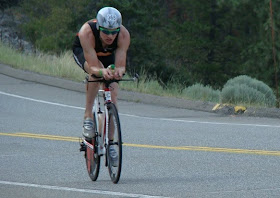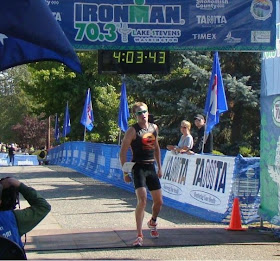
Jeff Symonds crushing dreams on his Cannondale Slice
Jeff Symonds, 26-year-old pro triathlete from Penticton, Canada, came to Texas for the Longhorn 70.3 last October. A native of the city that has hosted Ironman Canada longer than he's been alive, and a fast runner to boot, the question might be how could he not have embraced the sport? At the 2008 ITU Pan American Championships he was 7th overall and top under 23 elite finisher (earning himself a spot in the ITU World Championships in Vancouver), and in 2009, he was 2nd at the Canadian National Championships and 2nd at the Lake Stevens IM 70.3. In 2010, he won the Vancouver IM 70.3, placed 6th with the fastest run split at the Oceanside 70.3, and capped off the year with a 13th place finish at the World Championships. He has raced as a pro for three years, and his sponsors include Cannondale, Blue Seventy, Adidas, and Eload, with more to be announced soon. Jeff is coached by Kevin Cutjar of Impact Multisport, and races about once every three weeks. Sounds serious, right? Little did Jeff know he would be facing his fiercest opponent yet right here in Austin, in what he'd assumed to be domestic age-grouper tranquility.
Meet Lazarus. Laz's pedigree is not as impressive. He was an alley cat, abandoned by his mother, who also possibly (that is to say, the fact was not proven in a court of law) dropped him off a carport roof shortly after birth. Having a neurological disability, Laz is not the most intelligent or agile creature, but he is quite unpredictable...and large. Weighing in at approximately 17 pounds (and appearing somewhat larger, due to five of those pounds being fur), he is a formidable foe for any houseguest, particularly on late-night, half-conscious bathroom visits. When the unsuspecting visitor decides to exit the facilities, Laz is often crouched and waiting, just beyond peripheral vision, as said visitor emerges. He will then, releasing an unearthly yodel reminiscent of the Grim Reaper come to carve out your soul with a rusty scythe, go after your bare calves with his claws.
"He's kind of a like an alligator," explains the cat lady. "He can only run fast in a straight line." So Jeff spends the week traveling across his homestay diagonally, worrying not just about the race he's shelled out airfare and expenses for, but about the murder-cat that wants nothing more than to drink his blood and wear his earlobes as a trophy.
Now, to be fair, hosts can get a bad adopt-a-pro, too. The pro can eat only raw vegetables, for instance, or bring home loose women. But most of the time pros are about as tame as they can get. Often the pro doesn't date, go out to bars, drink coffee, or engage in high risk activities like water skiing or eating chocolate peanut butter ice cream. Most of the time he just wants to rest up for the race – it is his job, after all, even if it's not a high-paying one.
Not yet, Jeff would say. "The challenge is that you need money to train and race and you need to train and race to get money," he says. "So the problem is how you start the cycle. I've viewed the first few years of my career similar to how a college or university student would. I am paying my dues now so that I can set myself up for a career later." The sacrifices, he says, are just a part of that.
Pros don't choose triathlon because it fits their life; they choose their life because it fits with triathlon. Often they work jobs that don't match their degree or long-term plans because the job gives them the flexibility to train. It could be said, too, that they choose their partnerships in the same manner. How many wives or husbands who aren't athletes themselves could put up with someone who has to train multiple times every day? Or who wears compression socks out to dinner, and goes through strange dietary shifts depending on race schedules and the phases of the moon? And we won't broach the topic of holidays, vacations, or other special events. (Spouses of athletes: Did your Significant, Tri-Obsessed Other run, bike, or swim on the day of your wedding? Join the club...and then confess you did the same thing yourself.)
It takes a certain degree of determination – some say insanity – to be a pro triathlete. Beyond the difficulties of a shoestring budget, a pro stretches mind and body to the limit at every race, is constantly tearing and breaking things and waiting just long enough for them to heal before breaking them again, and is giving everything, everything for a pie-in-the-sky kind of goal that only one or two competitors are ever lucky enough to get a taste of, much less eat. And normalcy, dignity? Any good pro relinquishes that with his last 40oz and pint of Häagen Dazs.
Jeff, as a runner for his university team, once completed a 5000-meter race in the most vulnerable state a man can experience, short of a personal appearance on the Oprah Winfrey Show. "I put my race shorts on and my track suit over top. It wasn't until two minutes before the start that I realized a hole had formed in my shorts." But Jeff started the race anyway, in hopes that the goods wouldn't succumb to gravity, and if they did, that no one would notice. Lap 2...people are saying "wait, did I just see what I think I did?" By lap 4, "Yep, totally." And by the 8th lap? They brought out the video cameras. And Jeff, never living this moment in race history down, got second in what was described as a "ballsy" effort. "That," he says, "is as undignified as it gets."
It stands to reason that such a man could face the indomitable Laz and win. Imagine the scene of battle... The indigenous age groupers have already left for the morning, and the house is dark. Jeff enters the windowless garage to retrieve his gear for the pre-race meeting. As his eyes adjust, he notices an irregularly shaped mass on top of his GPS unit, the machinery that is his only hope of getting to the race site in this foreign land. Then he hears the familiar, ululating warning call. The opponents stare each other down from across the room, Jeff's hand twitching like a gunfighter. A lesser man would have thrown in the towel right then and there, but Jeff, a man of action, chooses his weapon. He cautiously approaches the spitting, hissing Laz...and pokes him with a plastic bike pump.
What occurs next is the subject of legend. As Jeff runs for cover, Laz streaks out of the room like a ball of howling, hairy lightning, and when the smoke clears, the Garmin is free. There's a moment of awed silence...and then Jeff (not one to gloat, we suppose) exits as quickly as possible.
Jeff came in fifth at the Longhorn 70.3, making the pay cut and the podium in spite of his many battle scars and late-night defensive maneuvers, and it was, in truth, an amazing thing to see. Age groupers are used to their plodding compatriots. Spectating to watch the pros, you don't have to wait long between stages before you see them back in transition. They're running sub six-minute miles, biking over 25 miles an hour, and swimming a pace of under 1:20 per 100 meters. In short, they're accomplishing more than your poorly trained, creampuff physique could ever begin to handle. Jeff is right with the lead pack for the whole race, and the normally reserved, quiet cat lady is jumping up and down like a ferret on ketamine.
There is one positive aspect of pro triathletes being poorly paid and under appreciated. It makes them human. You can talk to them. You can see them in action without paying $400 for a ticket. You can welcome them into your home. You can invite them out on a ride or a run (at your own peril, mind you). You can take your pro out to a BBQ joint – his first truly authentic Texas experience, he says – and listen to him talk about the race as if it was something he did every day (this is because he does, or nearly so) but in a way that still resonates with something like reverence. Because, you see, no pro ever does it – or at least, doesn't start doing it – for the money. He, or she, does it for the purest love one can ever conjure up – the love of moving stroke by stroke, pedal by pedal, stride by stride to a finish line that is always one race ahead, always a dream that is won by pure, hard, persistent effort.
Thank you, Jeff Symonds, for your inspiration. You're welcome back any time.



Great Article and very accurate depiction of what our lives are like!
ReplyDeleteKeep 'em coming,
Justin Harris
www.justinjharris.wordpress.com